Impact by Regions, Countries & Territories
UNDP’s Global Programme supports crisis-affected contexts across all regions to strengthen the rule of law and human rights. In this section, we present five regional overviews, detailing our priorities and approach depending on the context, as well as feature select country and territory results from 2021.
Five contexts from the list (Central African Republic, Democratic Republic of the Congo, Haiti, Mali and Yemen) illustrate the achievements of the Global Focal Point for the Rule of Law (GFP). In peacekeeping missions and transition settings, UNDP’s Global Programme works through the GFP to deliver integrated assistance with our UN partners.
GFP Global Focal Point Highlights
Political
Engagement
The rule of law is essential for sustainable peace and resilient economies, as well as for the prevention or recurrence of conflict. To prevent or address injustice, inequalities or democratic deficits, UNDP works with multiple stakeholders to operate in a way that is consistent with the rule of law and creates opportunities for all individuals to exercise their rights and access justice.
Institution
Building
The importance of strong institutions is more evident than ever as countries and communities respond to disruption, whether because of public health restrictions, climate change or political upheaval. Limitations on public gatherings and travel have revealed the need for institutions that are resilient to disruption.
Community
Security
2021 was a pivotal year that saw various developments affecting peace and security around the world. Civic space continued to shrink and the social contract between states and citizens was increasingly challenged, particularly during and after the response to the COVID-19 pandemic. Facing distressing consequences of climate change, states and communities are forced to manage more cross-border conflicts, triggered by the displacement of people seeking increasingly scarce resources.
Human Rights
Systems
The scope of human rights challenges is widening, from eroded public trust and shrinking civic space to ongoing inequality and human rights impacts in the socio-economic repercussions of the COVID-19 pandemic, and emerging risks in the digital sphere. National human rights institutions (NHRIs), along with other human rights defenders, are facing rising and sophisticated forms of reprisals for carrying out their work.
Access to
Justice
Sustainable Development Goal 16 (Peace, Justice and Strong Institutions) of the 2030 Agenda highlights the importance of access to justice for all for the development of peaceful and inclusive societies. Meaningful access to justice can only be achieved when people know their rights, have the opportunities, agency and capacities to claim them, and have access to independent, inclusive and people-centred justice systems that will respond in a timely, fair and effective manner.
Transitional
Justice
Without justice, there can be no lasting peace. In post-conflict, crisis-affected and fragile contexts, truth-seeking initiatives and reconciliation efforts are essential to bring peace to affected communities. The COVID-19 pandemic has slowed down transitional processes as states prioritized their response to the health crisis and measures to support the economy.
Gender
Justice
In 2021, the continued erosion of democracy and the spread of authoritarian trends in politics in many parts of the world contributed to a backlash against women’s rights. The COVID-19 crisis has reversed some of the hard-won gender parity gains by exacerbating pre-existing inequalities and power imbalances. It has also caused a dramatic increase in sexual and gender-based violence (SGBV). All these challenges have been particularly acute in conflict, fragile and crisis-affected settings.
Innovation
New ideas and new strategies are critical to building sustainable and effective development approaches that really meet people’s needs. Technologies and globalization raise new human rights concerns and threaten the rule of law. Responses to the COVID-19 pandemic continue to limit people’s access to basic services. UNDP connected expertise across the globe to learn and adapt. Creating a culture of curiosity and experimentation, these efforts ensured that local needs and expertise were combined with emerging models to bring strategic thinking to people-centred development goals.

Haiti
In Haiti, the security situation deteriorated causing socio-economic tensions and a loss of public confidence in the police. According to the Barometer of the Americas, 60 percent of Haitians feel insecure in their country. Meanwhile, the Haitian National Police (HNP) is facing structural and operational challenges, loss of human resources (over 1,700 police officers have quit in the last two years) and urgent need for reforms. To respond to this demand, in close cooperation with the UN Integrated Office in Haiti (BINUH), UNDP supported the establishment of a Command-and-Control Operational Center for the HNP to strengthen its capacities in fighting organized crime. In addition, UNDP commissioned an extensive study on justice and security in Haiti and used it as a basis to develop a comprehensive programme to support the HNP. The implementation of the programme will start in 2022.
UNDP’s programming in Haiti was aimed at closing the gaps of the justice system, fighting impunity and high criminality. In 2021, the activity of criminal gangs slowed down all of the judicial proceedings in Port-au-Prince, the capital. UNDP delivered technical and financial support to Legal Assistance Offices (LAOs) in the sectors of Port-au-Prince and Les Cayes which provide legal services and judicial representations for individuals in prolonged pre-trial detention. Also, UNDP supported four civil society organizations that processed over 1,500 cases of vulnerable detainees. As a result, 317 detainees (63 women, 254 men) were released. In one emblematic case, a man had spent five extra years in prison after his term of conviction and gained his freedom only after the LAO’s intervention. In total, 430 people (43 women, 387 men) received legal services through LAOs.
To ensure that more people have access to legal aid, UNDP supported legal clinics where 475 individuals (279 women, 196 men) were consulted, and civil society organizations (CSOs) provided legal support to 1,027 individuals (221 women, 806 men).
UNDP encouraged strengthened cooperation of LAOs and legal clinics with the Ministry of Justice, for greater synergies, referrals and consultations.
In previous years, UNDP promoted the adoption of the law on legal assistance and the operationalization of the National Council on Legal Assistance (CNAL), a coordination body for LAOs. In 2021, UNDP provided the CNAL with two vehicles that allowed it to visit remote areas in ten districts and support the work of LAOs. UNDP continued strengthening the capacity of the CNAL by providing equipment and software, as well as by supporting the design of the National Policy on Legal Assistance and the Code of Conduct. Efforts were made to open the CNAL offices in the regions of Port-au-Prince, Petit Goave, Les Cayes Gonaives and Port de Paix in 2022.
To enhance progress in trials and minimize the time people spend in pre-trial detention, UNDP opened a temporary tribunal on the prison premises in Les Cayes. The tribunal is expected to have 20 trials per month. In addition, UNDP improved conditions and equipped two courts and police stations in Anse-à-Veau, and police headquarters in Cap Haitien operating under the Ministry of Justice and Security. UNDP supported the Directorate of Penitentiary Administration to improve its internal structure and procedures. To equip the Directorate with management tools, UNDP supported the construction of a secure data warehouse and provided necessary equipment and technologies. As a result, the authorities will be able to connect all the penitentiary institutions via a secure VPN network to assess occupancy levels in prisons and monitor individual cases when an inmate requires medical or other assistance.
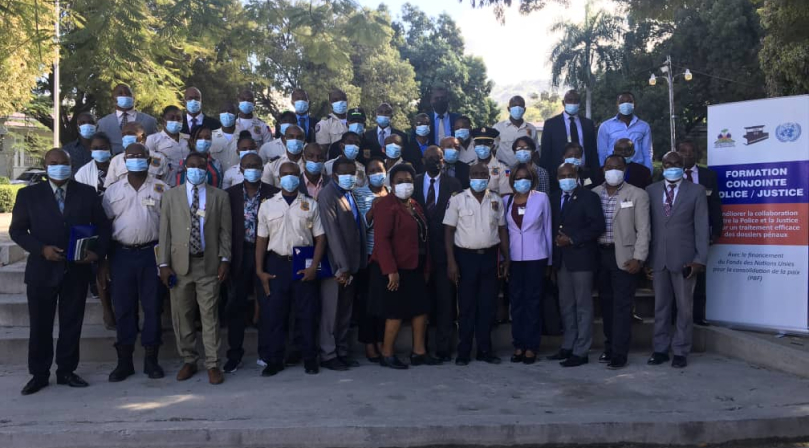
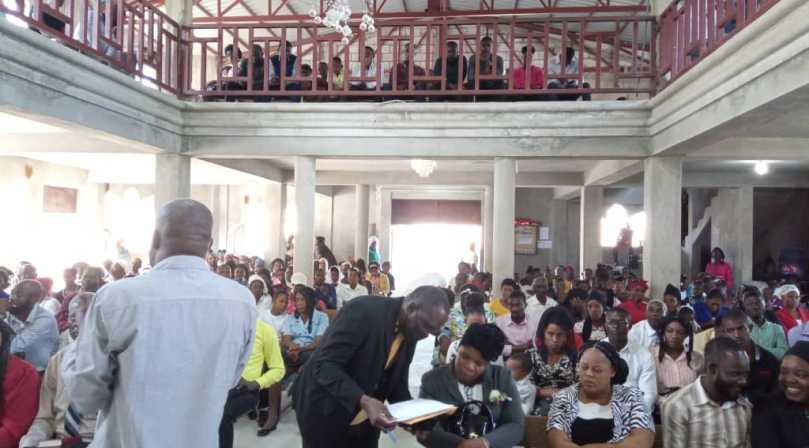
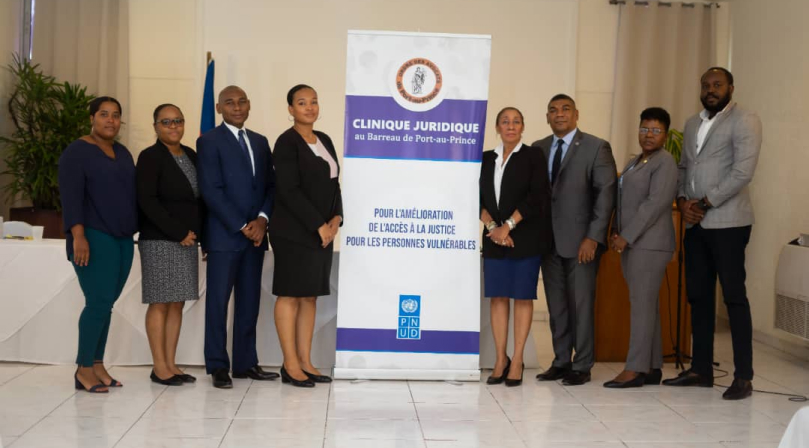
In 2022, Haiti’s new Penal Code and the Code of Penal Procedure will come into force. Jointly with BINUH, UNDP will support the Government to ensure effective implementation of these two critical pieces of legislation that have a potential to strengthen the rule of law in the country. The project enabling police reform will continue focusing on fighting gang and organized crime, tackling corruption, improving the intelligence services of the police, and ensuring more gender parity in law enforcement and penitentiary bodies.
Evolution of legal support the LAOs have provided
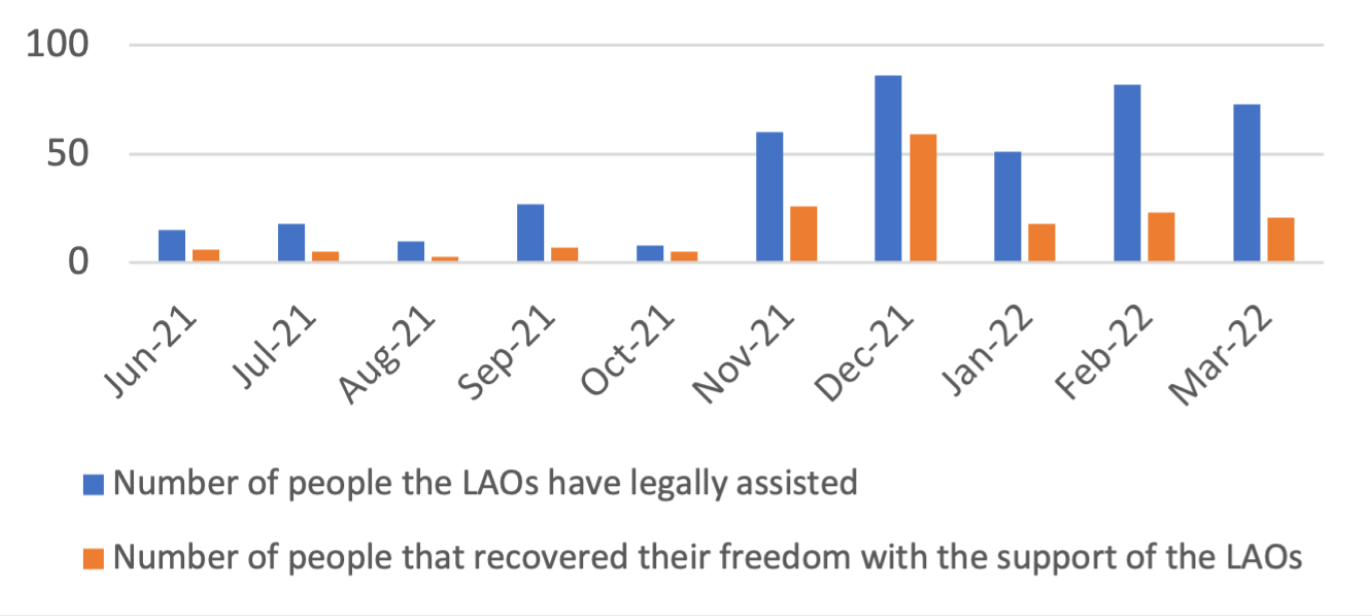
Evolution of legal support request and number of cases the LAOs have accepted
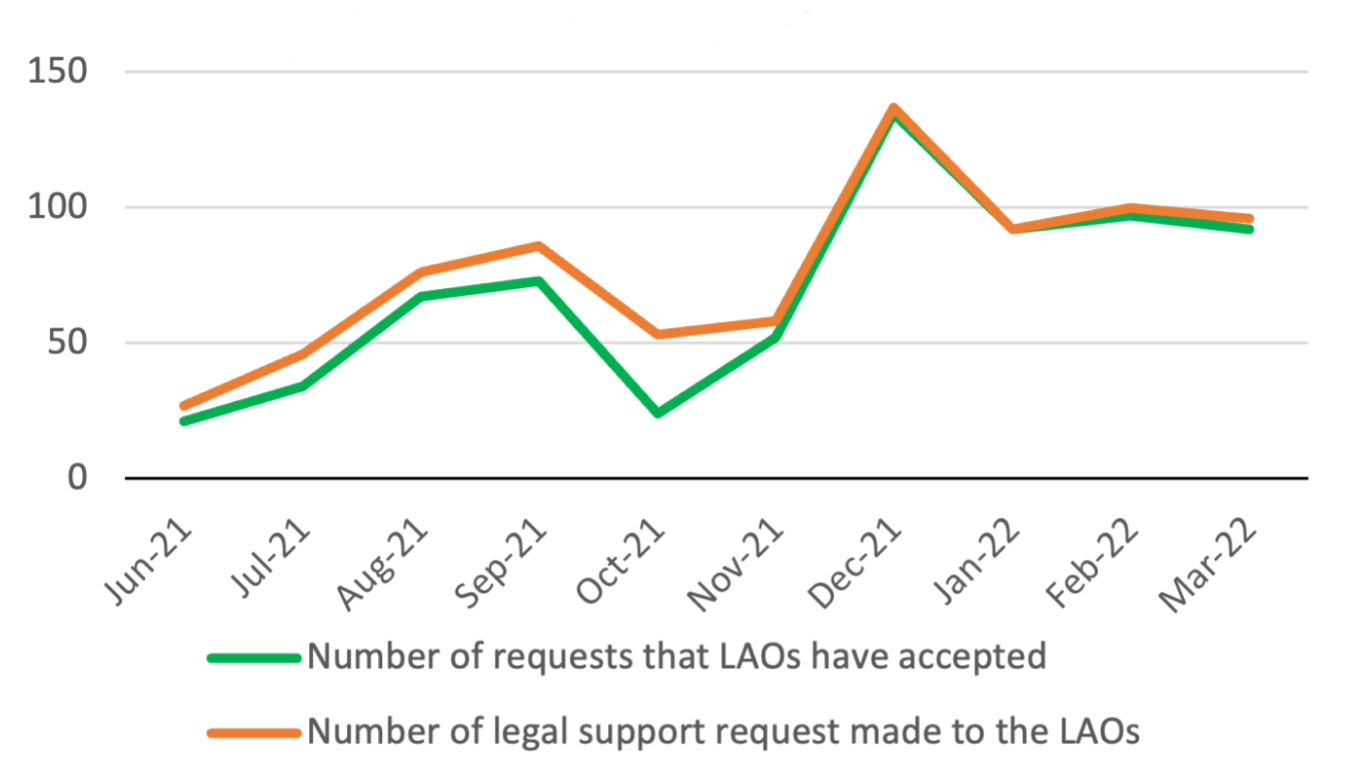
Key Results: Haiti
1,932 people (543 women, 1,389 men) received legal services and consultations through Legal Assistance Offices (LAOs), legal clinics and civil society organizations (CSOs) supported by UNDP.
317 detainees (63 women, 254 men) were released through the efforts of the LAOs and four human rights CSOs.
UNDP enabled four CSOs to process over 1,500 cases of vulnerable detainees facing prolonged pre-trial detention.
